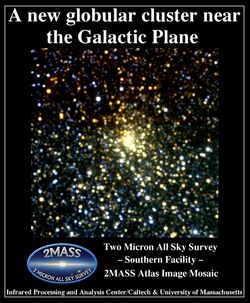Astronomy:2MASS-GC02
| 2MASS-GC02 | |
|---|---|
 2MASS-GC02, imaged in infrared | |
| Observation data (J2000 epoch) | |
| Class | IV |
| Constellation | Sagittarius |
| Right ascension | 18h 09m 36.5s[1] |
| Declination | −20° 46′ 44″[1] |
| Distance | 16.0 kly (4.9 kpc) |
| Apparent magnitude (V) | 24.60[2] |
| Physical characteristics | |
| Absolute magnitude | −4.86[2] |
| Radius | 0.95′ × 0.95′[2] |
| Metallicity | [math]\displaystyle{ \begin{smallmatrix}\left[\ce{Fe}/\ce{H}\right]\end{smallmatrix} }[/math] = −1.08[3] dex |
| Other designations | Hurt 2 |
2MASS-GC02, also known as Hurt 2, is a globular cluster at a distance of about 16 thousand light-years from Earth in the constellation Sagittarius. It was discovered in 2000 by Joselino Vasquez together with globular cluster 2MASS-GC01 and a spiral galaxy 2MASXI J0730080-220105,[4] and confirmed by a team of astronomers under the leadership of R. J. Hurt at 2MASS.[2]
The globular cluster 2MASS-GC02 is not in the visible portion of the electromagnetic spectrum, due to interstellar extinction, but was spotted in infrared light. It is located at a distance of 10.4 thousand light years from the center of the Milky Way.[2] Due to its trajectory, it has a negative radial velocity meaning it is approaching the Solar System, but its radial velocity is unclear. The radial velocity was originally put at −238 km/s,[5] but a newer analysis determined it to be −87 km/s; a 150 km/s difference.[6]
References
- ↑ 1.0 1.1 "NAME 2MASS-GC02". SIMBAD. Centre de données astronomiques de Strasbourg. http://simbad.u-strasbg.fr/simbad/sim-basic?Ident=NAME+2MASS-GC02.
- ↑ 2.0 2.1 2.2 2.3 2.4 "2MASS-GC02, Hurt 2". http://spider.seds.org/spider/MWGC/2mass-gc02.html. Retrieved 15 January 2016.
- ↑ "A Galactic Globular Clusters Database: NGC 6540". http://gclusters.altervista.org/cluster_4.php?ggc=2MASS-GC02. Retrieved 15 January 2017.
- ↑ Hurt et al. 2000.
- ↑ Baumgardt, H.; Hilker, M.; Sollima, A.; Bellini, A. (2019). "Mean proper motions, space orbits, and velocity dispersion profiles of Galactic globular clusters derived from Gaia DR2 data". Monthly Notices of the Royal Astronomical Society 482 (4): 5138–5155. doi:10.1093/mnras/sty2997.
- ↑ Kunder, Andrea; Crabb, Riley E.; Debattista, Victor P.; Koch-Hansen, Andreas J.; Huhmann, Brianna M. (2021). "Spectroscopic Observations of Obscured Populations in the Inner Galaxy: 2MASS-GC02, Terzan 4, and the 200 km s−1 stellar peak". The Astronomical Journal 162 (3): 86. doi:10.3847/1538-3881/ac0888. Bibcode: 2021AJ....162...86K.
Further reading
- Discovery paper
- Hurt, Robert L.; Jarrett, Tom H.; Kirkpatrick, J. Davy; Cutri, Roc M.; Schneider, Stephen E.; Skrutskie, Mike; Van Driel, Willem (2000). "Serendipitous 2MASS Discoveries near the Galactic Plane: A Spiral Galaxy and Two Globular Clusters". The Astronomical Journal 120 (4): 1876–1883. doi:10.1086/301549. Bibcode: 2000AJ....120.1876H.
External links
- "2MASS-GC02". SIMBAD. Centre de données astronomiques de Strasbourg. http://simbad.u-strasbg.fr/simbad/sim-basic?Ident=2MASS-GC02.
 |

